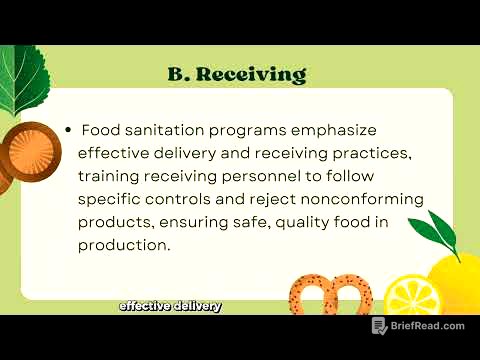TLDR;
The video discusses emotional maturity and provides eight actionable tips to develop it. It emphasizes the importance of understanding and managing one's emotions, taking responsibility, and maintaining a positive outlook. The tips include identifying emotions, taking responsibility, finding a role model, keeping a thought diary, being open-minded, embracing reality, pausing and being patient, and living in the present.
- Identifying and understanding emotions is the first step toward managing them.
- Taking responsibility for one's actions and learning from mistakes is crucial for growth.
- Cultivating a positive mindset and challenging negative thoughts can improve mental health.
Introduction to Emotional Maturity [0:00]
The video introduces the concept of emotional maturity, distinguishing it from general maturity. Emotional maturity involves managing feelings effectively, showing empathy, and resolving conflicts. Emotionally mature individuals are those who can handle their feelings in various situations and are often sought out for advice and support during tough times. The video promises to provide eight ways to become more emotionally mature.
Identify Your Emotions [1:08]
The first step to emotional maturity is identifying your emotions. Before reacting in a heated situation, it's important to understand what you're feeling and why. Recognizing emotions like irritation or anger allows you to understand their root cause and address them effectively. Keeping a journal to track instances of anger or sadness, along with their triggers, can help you become more aware of your emotional patterns and manage them better.
Take Responsibility [2:20]
Taking responsibility for your actions is a sign of emotional maturity. Denying mistakes prevents learning and growth. Acknowledging when you're wrong and taking action on your responsibilities allows you to learn from your mistakes and avoid repeating them. Holding yourself accountable demonstrates emotional maturity and fosters personal development.
Find a Role Model [2:58]
Finding a role model can guide you in stressful situations. Observing how someone you admire handles difficult situations can provide valuable insights. While it's important to remain true to yourself, learning from a role model's positive and emotionally mature behavior can help you develop better coping mechanisms and responses.
Keep a Thought Diary [3:43]
Keeping a thought diary can help manage negative thoughts. Negative thoughts can accumulate and create a harsh thinking pattern. Cognitive restructuring, through a thought diary, involves writing down daily feelings, identifying stressors, and finding alternative perspectives. Recognizing recurring negative thoughts can help you realize they're not worth worrying about and develop practical solutions. Counteracting negative thoughts with positive ones is also beneficial.
Learn to Be Open-Minded [5:04]
Being open-minded is a key trait of emotionally mature people. It involves considering perspectives other than your own and actively listening to opposing opinions without immediately judging or trying to persuade others. Open-mindedness allows for new experiences, enjoyment of diverse content, and the potential to learn and realize you were wrong. Even without agreeing, understanding others' beliefs can be powerful.
Embrace Reality [6:06]
Embracing reality involves accepting your circumstances and flaws instead of dwelling on them. Rather than suppressing or being consumed by negative thoughts about your reality, find peace with it. If change is possible, work towards it; if not, embrace who you are and strive for what brings you joy. Embracing reality brings clarity and peace.
Pause and Be Patient [6:52]
Pausing and being patient in heated arguments can prevent saying things you regret. Acting on impulse when upset can lead to negative outcomes. Taking a moment to reflect allows you to express your feelings and understand yourself better. Choosing to pause in stressful situations gives you the option to consciously choose how to react, leading to emotional maturity.
Live in the Present [7:26]
Living in the present is crucial for emotional maturity. Dwelling on the past causes sadness and regret, while dwelling on the future causes stress. Being present allows you to make conscious decisions and avoid negative reactions or old habits. The present is the only moment you can act, choose, experience, and enjoy.









